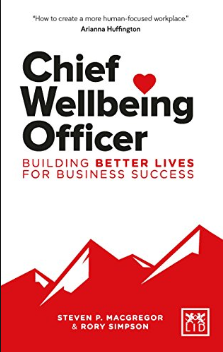Chief Wellbeing Officer
Building Better Lives for Business Success


The authors are long-time collaborators, both being Scots based in Barcelona and focused on leadership development. Steven P MacGregor is an executive performance consultant and founder of the Leadership Academy of Barcelona. He has taught executives at IESE, IMD and CEIBS business schools. Rory Simpson has been Chief Learning Officer at Telefónica since 2011 and was previously an Associate Dean at London Business School.
In parallel with the emergence of the Chief Digital Officer to inform and co-ordinate organizations’ digital transformation, has been the realisation that the continuous change that digital transformation requires is exhausting and calls for a different mindset and culture of behaviours to manage sustainably. This new ‘sustainable’ approach is increasingly seen as not being a transactional model but a more human/relational one, and with that perspective on achieving employee health and happiness as the foundations of all successful organizations, the search for wellbeing begins…. and so the need for someone to oversee and be responsible for its delivery: the Chief Wellbeing Officer.
The Fourth Industrial Revolution is much more of a human than a technical challenge. “Machines will supply us with the insight and perspectives we need to reach [the staggering rewards of heightened living standards, enhanced safety and security, superhuman abilities]. But they won’t supply the judgement or ingenuity. Humans will.” The focus now is more on individualisation than mass commodification.
Today, famine and warfare are not the big killers, these are over-eating and lack of exercise…and depression. “More people commit suicide [globally] than are killed by soldiers, terrorists and criminals combined. Organizations are, by definition, social constructs made up of people in a more or less complex formulations and the more we understand how they do and do not work and what drives them, the clearer it becomes that a people focus, where the things that cannot be provided by machines such as enthusiasm, imagination, passion, that keep organizations alive and progressive have to be nurtured in environments where the people that can provide these positive attributes feel happy, healthy and safe.
The authors break the book into three sections: ‘Chief’, that looks at the high-level macro changes that lead us to this realisation; ‘Wellbeing’, that explores how health and wellbeing is such a vital lever to enabling better performance; and, you guessed it, ‘Officer’, which describes some of the executive actions that we can take to create such an environment, though they freely admit that we are just at the beginning of this journey in organizational terms, so these are indicative suggestions not a complete formula.
Their Seven Hacks to achieve effective wellbeing habits include:
• Focus on small, iterative changes “what you do everyday matters more than what you do every once in a while”
• Set specific goals, not to take the stairs rather than the escalator from now on, but for the rest of the month, and then reset the goal.
• Supported, combine new behaviours with established one, eg do 5 squats after you brush your teeth, this sets triggers and good loops.
• Social, “we are the average of the 5 people we spend the most time with” identify who will be the best influence on you t achieve your desired behaviours.
For the other ‘S’ hacks you’ll need to get the book!
Wellbeing, care, sustainability and a greater overall focus on what it means to be human are becoming ever more important levers in creating organizational success. This trend will only continue and amplify as we learn to co-exist, collaborate and differentiate from machine-learning applications and robots. Those who can understand how to manage these two progressive paths well will be best placed to reap the rewards of the coming decades. This book provides an excellent primer for starting down this road.
Title: Chief Wellbeing Officer, Building Better Lives for Business Success
Author/s Name/s: Steven P. MacGregor and Rory Simpson
Publisher: LID Publishing
ISBN: 978-1-977-498-773
Publishing Date: October 2017May 2018
Number of Pages: 246
Author Knowledge Rating: 1-5 (based on their years of experience, academic expertise in subject areas, and exposure to cross-functional thinking in the area)













































































Readability: 1-5 score(1=dense and v academic; 5=frantic; page turner)































































































Appropriate Length: (1=could have been written in 25% of the length;5=could have been longer)















































































Core Idea Value: (1=nonsense (or entirely esoteric); 5=game-changer)














































































